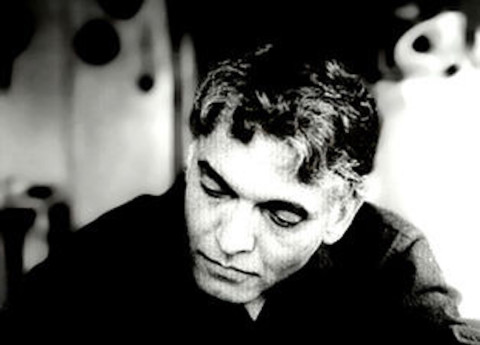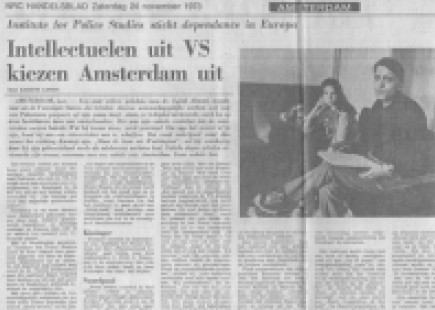Ideas into movement
Boost TNI's work
50 years. Hundreds of social struggles. Countless ideas turned into movement.
Support us as we celebrate our 50th anniversary in 2024.

A few weeks ago when dr. Eqbal Ahmad, a professor from the United States, who, in addition to a number of scientific works also has a Pakistani passport to his name, arrived at Schiphol Airport, he was detained for two hours. It was his single fair ticket which caused the authorities some consternation. He was asked what he was coming to do in Amsterdam. To relieve himself of this nagging he offered to buy a return ticket. This the authorities thought in order, but it had to be a ticket to Karachi. 'But I come from Washington', he desperately pleaded, as he had already as an adolescent left his land of birth. A few days later his wife arrived, also with only a single fair ticket to Amsterdam. There was no problem.


The first interview on TNI: Dutch transcript
Dr. Ahmad relates this incident with considerable irritation as Holland has the same relations with Pakistan as with the United States. He suspects that it all has to do with a fear of flood of migrants, now that the UK is in the EC. 'They probably took me for an uninvited migratory labourer'.
Nevertheless, Dr. Ahmad came to Amsterdam as not only is this city centrally situated but also has an aura of tolerance about it.
The IPS situated in Washington has given Mr. Ahmad full mandate to set up an affiliate in Europe. In a large rather empty house on Paulus Potterstraat, this institute will begin functioning next year and will not be comparable with any other Dutch institution.
It will concentrate on scientific research and social action. Left. Clear. The word "Third World" will fall often probably with some more depth than is generally the case in our country. Internationally known left intellectuals will walk in and out. Sartre maybe, his health permitting. John Gerassi, an American, the man who Sartre chose as his biographer. Tom Nairn, editor of the New Left Review and author of political works. John Gittings, editor of the Far East Economic Weekly. These last three people paid by the Institute for scientific research. The Dutch contacts are mainly Dr. Ernst Utrecht, publicist and Indonesian specialist, and Gerrit Huizer, who teaches at the University of Nijmegen on Third World problems.
'Everybody', says Dr. Ahmad openly, 'who is against imperialism and for social justice, is welcome with us. Communists, Trotskyists. We are not sectarian'. A young American, Helen Hopps, who spent the summer fixing up the building and making arrangements, adds that the Institute should not become a 'think-tank', an American abusive word for institutes going into endless theorising.
Kissinger
Plans exist for the Institute for Policy Studies which is going to be called the Transnational Institute here, to hold three conferences: 1. Chile, 2. Kissinger, 3. the energy crisis. With all these three cases Mr. Kissinger is involved, as will become apparent.
North Pole
'Two weeks ago before I came here', Dr. Ahmad tells, 'I was asked: are you going to Europe? Why don't you then go to Oslo on the 10th of December when Kissinger receives the Nobel Prize? It was expected that I would organise a teach-in. But when I was in Paris to make preparations for this case, I heard on the radio of the taxi that Kissinger was not going himself. Well, then I also have no longing to go to the North Pole. In March, when our building is finished, we can do it here. It is indeed necessary. In Europe people have respect for the intelligence of this man. People do not see that his politics are very dangerous'.
For the meeting in March, Sartre will be invited as well as Noam Chomsky, an American literary professor. Sartre probably will not come. He is very sick. In January, TNI will be venue for a congress on Chile. With as theme 'What does Chile tell us about Kissinger and Nixon? What does Chile teach us? What does it tell us about the new American post-Vietnam strategy?' explains Dr. Ahmad. 'The boycott of American banks with which the US worked against Allende would never have been successful had Europe not participated. And what did the European trade unions do? Rien', dr. Ahmad exclaims in disgust, going over into French. In June, there will be a conference on the energy crisis. 'I hope that the crisis in which you find yourself now will then be passed', says Dr. Ahmad, 'but the energy crisis will still be there. We must', says he, 'create new bonds between progressive people and groupings. Because the imperialist forces', he grins, 'are bound to be very strong bonds. We pretend', says Dr. Ahmad, 'not to be that (the thing) which will solve the problem, but we have what no other grouping here has, we have access to research material accumulated over years of experience in the US'.
Millionaires
The Institute in Washington works in a way unknown to Dutch concepts. Completely free from government subsidies, the Institute runs on a small number of millionaire donators. Some ten or twelve. Sam Rubin is amongst them and has a chair at the University for Negro problems. Philip Stern, a millionaire Maoist who has the book to his name 'The Rape of the Taxpayer'. A trader in real estate, Ed Janss, also a donator, sold the Institute the building on the Paulus Potterstraat.
A small disappointment: when the Institute decided four years ago to start here, it was a consideration that things were so cheap here. In the meantime, prices have doubled.
Two associates of the late President Kennedy started the Institute for Policy Studies in 1961. They were Richard Barnet and Marcus Raskin, young men, 'slightly left from the center', as Dr. Ahmad expresses it. Together they resigned from the White House 'because they thought that the Kennedy administration was not serious over disarmament and equal civil rights for negroes. These were, says Dr. Ahmad, 'the great days of Martin Luther King when the issue was whether a negro could drink a cup of coffee undisturbed. The young associates of Kennedy, Barnet and Raskin, were disappointed in their president. The latter, who was disarmament adviser of Kennedy and who wrote numerous books (among others on Bernard Fall, the expert who died in Indochina), was later tried in the Vietnam trials made known by Dr. Spock, child specialist. Raskin was acquitted. Dr. Ahmad himself saw the court from inside during the 'Harrisbury' trials when sentences of life were meted out for complicity in planning to kidnap Kissinger.
The Institute presently works with some 30 men, coming out of the 'cry of anger' of bourgeois figures as Dr. Ahmad calls it. He states not without pride that the Institute was placed at the top of the enemy list in the Watergate hearings. 'We were insulted in the newspaper', he says, 'people called us the "Rand Corporation of the Left"'. The Rand Corporation, the institute where Daniel Ellsberg worked, does research for the CIA, Army and Air Force.
Floris V
What sort of man is Dr. Ahmad? He was a Professor but now devotes all his time to the Institute and writing articles in numerous journals. He worked for many years in North Africa and his speciality (his subject is political science) is formally the Middle East. He is 41. 'I was born in what was then India', he says. He left his fatherland, his family and all that he had behind him in 1938. 'God what a long time ago actually'. In 1972 'after the military government fell'. Before Pakistan existed, when Eqbal Ahmad was three years old, his father died, about in the manner of Floris V. He was a landowner, progressive and murdered by his colleague landowners. Ahmad is working at present on two books. One concerns the foreign military plans of the United States and another book which he is writing with somebody else concerns 'reaction and revolution in the Third World'.
His livelihood, and that of his wife, child and colleagues, is uncertain. It does not only depend on the disposition of the donators but also 'if they change their mind then we will not even want their money', he says. He looks at Helen Hopps who nods affirmatively as he names the books that Raskin wrote in the sixties and the more recent works in which it becomes apparent how much more radical the Institute has become over the years. 'Through experience and frustration', he feels, 'became wise. Not I', says Ahmad satisfied, 'I was a Marxist from the beginning. I find that nothing changes before the capitalist system is overthrown', he says and after this firm statement: 'Now we are all like this at the Institute. I am of course in the clouds'.
Eqbal Ahmad Archive
Related Websites
Eqbal Ahmad: Cherishing His Courage